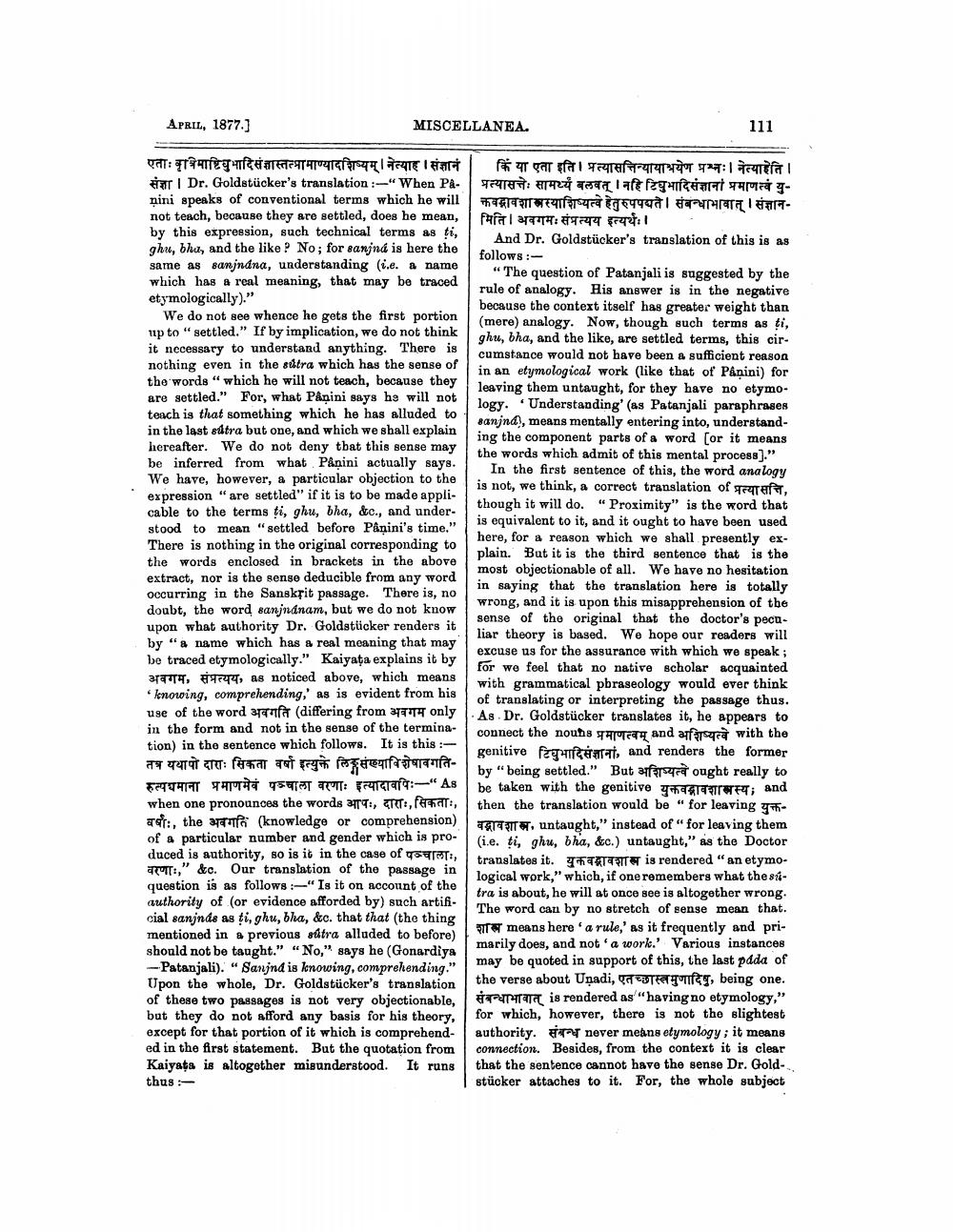________________
APRIL, 1877.]
MISCELLANEA.
एताः कृत्रिमाष्टिषुभादिसंज्ञास्तत्प्रामाण्यादशिष्यम् | नेत्याह । संज्ञानं Dr. Goldstücker's translation::-"When Pånini speaks of conventional terms which he will not teach, because they are settled, does he mean, by this expression, such technical terms as ți, ghu, bha, and the like? No; for sanjná is here the same as sanjnána, understanding (i.e. a name which has a real meaning, that may be traced etymologically)."
We do not see whence he gets the first portion up to "settled." If by implication, we do not think it necessary to understand anything. There is nothing even in the sutra which has the sense of the words "which he will not teach, because they are settled." For, what Panini says he will not teach is that something which he has alluded to in the last sutra but one, and which we shall explain hereafter. We do not deny that this sense may be inferred from what Panini actually says. We have, however, a particular objection to the expression "are settled" if it is to be made applicable to the terms ți, ghu, bha, &c., and understood to mean "settled before Pânini's time." There is nothing in the original corresponding to the words enclosed in brackets in the above extract, nor is the sense deducible from any word occurring in the Sanskrit passage. There is, no doubt, the word sanjnánam, but we do not know upon what authority Dr. Goldstücker renders it by "a name which has a real meaning that may be traced etymologically." Kaiyata explains it by , as noticed above, which means knowing, comprehending,' as is evident from his use of the word зnfa (differing from 3 only in the form and not in the sense of the termination) in the sentence which follows. It is this:तत्र यथापो दाराः सिकता वर्षा इत्युक्ते लिङ्गसंख्याविशेषावगतिरुत्पद्यमाना प्रमाणमेवं पञ्चाला वरणाः इत्यादावपिः - " As when one pronounces the words आप, दारा, सिकताः, वर्ष:, the अवगति (knowledge or comprehension) of a particular number and gender which is produced is authority, so is it in the case of :, :," &c. Our translation of the passage in question is as follows:-"Is it on account of the authority of (or evidence afforded by) such artificial sanjnás as ți, ghu, bha, &c. that that (the thing mentioned in a previous sutra alluded to before) should not be taught." "No," says he (Gonardiya -Patanjali). "Sanjnd is knowing, comprehending." Upon the whole, Dr. Goldstücker's translation of these two passages is not very objectionable, but they do not afford any basis for his theory, except for that portion of it which is comprehend ed in the first statement. But the quotation from Kaiyata is altogether misunderstood. It runs thus:
111
किं या एता इति । प्रत्यासत्तिन्यायाश्रयेण प्रश्नः । नेत्याहेति । प्रत्यासत्तेः सामर्थ्यं बलवत् । नहि टिघुभादिसंज्ञानां प्रमाणत्वं युकवद्भावशास्त्रस्याशिष्यत्वे हेतुरुपपद्यते । संबन्धाभावात् । संज्ञानमिति । अवगमः संप्रत्यय इत्यर्थः ।
And Dr. Goldstücker's translation of this is as follows:
"The question of Patanjali is suggested by the rule of analogy. His answer is in the negative because the context itself has greater weight than (mere) analogy. Now, though such terms as ți, ghu, bha, and the like, are settled terms, this circumstance would not have been a sufficient reason. in an etymological work (like that of Panini) for leaving them untaught, for they have no etymology. Understanding' (as Patanjali paraphrases sanjna, means mentally entering into, understanding the component parts of a word [or it means the words which admit of this mental process]."
In the first sentence of this, the word analogy is not, we think, a correct translation of refer though it will do. "Proximity" is the word that is equivalent to it, and it ought to have been used here, for a reason which we shall presently explain. But it is the third sentence that is the most objectionable of all. We have no hesitation in saying that the translation here is totally wrong, and it is upon this misapprehension of the sense of the original that the doctor's peculiar theory is based. We hope our readers will excuse us for the assurance with which we speak ; for we feel that no native scholar acquainted with grammatical phraseology would ever think of translating or interpreting the passage thus. As Dr. Goldstücker translates it, he appears to connect the nouns प्रमाणत्वम् and भशिष्यत्वे with the genitive टिघुभादिसंज्ञानां, and renders the former by "being settled." But as ought really to be taken with the genitive युक्तवद्भावशास्त्रस्य; and then the translation would be "for leaving -
. untaught," instead of " for leaving them (ie. ti, ghu, bha, &c.) untaught," as the Doctor translates it. is rendered "an etymological work," which, if one remembers what the sitra is about, he will at once see is altogether wrong. The word can by no stretch of sense mean that.
means here 'a rule,' as it frequently and primarily does, and not a work.' Various instances may be quoted in support of this, the last pada of the verse about Unadi, एतच्छास्त्रमुणादिषु, being one. is rendered as "having no etymology," for which, however, there is not the slightest authority. never means etymology; it means connection. Besides, from the context it is clear that the sentence cannot have the sense Dr. Goldstücker attaches to it. For, the whole subject




